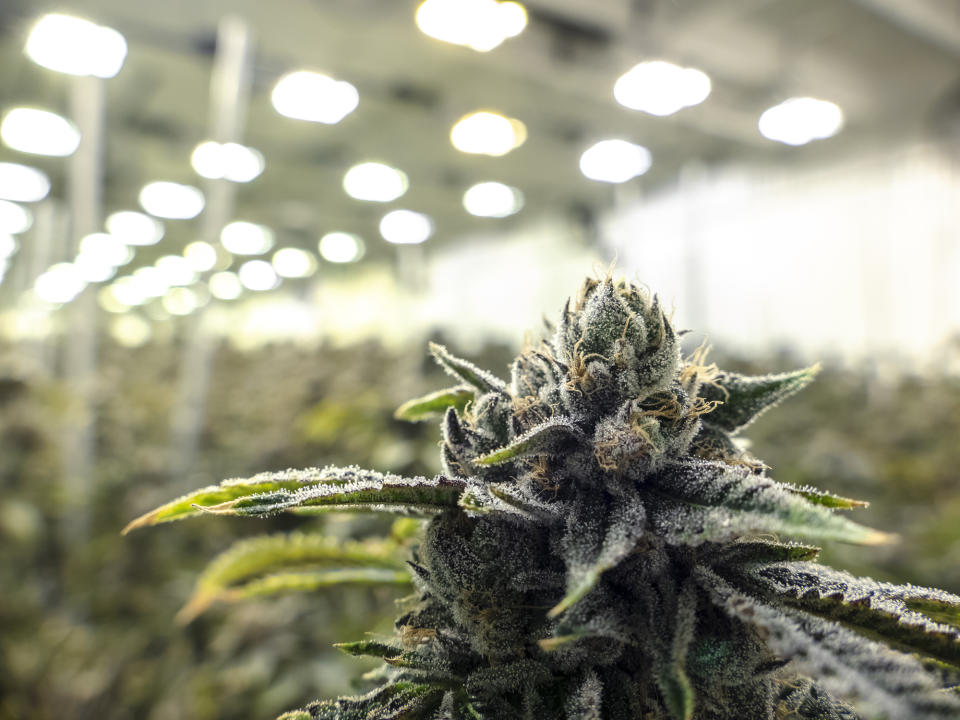3 Marijuana Penny Stocks That Are Actually Major Players
A decade from now, investors may very well look back and proclaim the cannabis industry to be the greatest growth opportunity of our generation. We know the demand is there given the tens of billions of dollars that exchanges hands in illicit channels each year. It's simply a matter of ongoing legalizations and ramp-up efforts to move those black-market pot sales into legal channels. If this happens, $75 billion in annual sales by 2030 is easily achievable, according to one Wall Street firm.
But what you may not realize is that while many of the major legal players have billion-dollar market caps, not all of them fit the mold of what you'd think a major cannabis company would look like. Right now, there are three marijuana penny stocks that are expected to be very important players in the Canadian pot industry.

Image source: Getty Images.
Auxly Cannabis Group
Auxly Cannabis Group's (NASDAQOTH: CBWTF) market cap of $355 million, as of closing on Wednesday, July 3, is hardly pedestrian. However, its $0.60 share price (that's 60 cents), doesn't exactly fit the definition of a company you'd expect to be a leader in the cannabis space. But rest assured, Auxly may very well be the real deal.
Until roughly the midpoint of 2018, Auxly Cannabis Group was entirely focused on operating as a royalty company. Much in the same way precious-metal royalty companies forward cash to their licensing partners in exchange for mined metals at a below-market cost, Auxly was providing cash to growers in exchange for future cannabis production at a below-market cost. This would allow the company to then sell this product, or a derivative of dried flower (e.g., oils, edibles, infused beverages, topicals, and so on), at the full market rate, thereby pocketing the difference as profit.
Auxly changed its approach a bit about a year ago, primarily because the royalty model didn't allow Auxly much wiggle room on lowering its costs, and also because it'll further assist the company in controlling its supply. It still has deals with more than a dozen licensed producers, but now also has a joint venture and wholly owned grow projects in its portfolio. All told, Auxly will control -- and by control, I mean bring to market via its licensing partners, joint ventures, and wholly owned farms -- about 170,000 kilos a year. There are, perhaps, only five or six individual pot growers with a larger marijuana retail presence in Canada.
There are two reasons Auxly's stock has received little love from investors. First, it's been issuing a lot of stock to raise money to fund its licensing deals and wholly owned cultivation expansion. These share issuances tend to be dilutive to existing shareholders.
Secondly, the company has made clear that it's holding back dried flower sales in the near-term in favor of bringing higher-margin derivative products to market later this year. Derivatives will begin hitting Canadian dispensary shelves by no earlier than mid-December. While a long-term positive for Auxly, this wait has been hurting the company's near-term operating results.
Despite its minuscule share price, Auxly has the makings of a major Canadian marijuana company.

Image source: Getty Images.
Zenabis Global
As of this past Wednesday, a share of Zenabis Global (NASDAQOTH: ZBISF) could be had for a mere $1.45, which is the type of pocket change we likely have hanging around in our couch cushions. But as with Auxly, you can't judge a book by its cover.
Zenabis, which sports a respectable $288 million market cap, currently slots in as one of the 10 largest individual growers in Canada. According to an investor presentation from the company, Zenabis Global expects to be producing 131,300 kilos on an annual run-rate basis by sometime in August 2019. Most of this production will come from the maxing out production at the company's Atholville campus in New Brunswick (34,300 kilos), and from the expansion of what will be its flagship Langley campus in British Columbia (96,100 kilos).
What's truly remarkable about Zenabis Global is that this could be just the beginning of its annual output. The Langley campus sits on a 2.1-million-square-foot parcel of land that, if built out, could accommodate up to 426,000 kilos of annual output, according to company estimates. That puts Zenabis on track for more than 479,000 kilos of peak capacity, if it chose to fully develop its Langley campus. Plus, with the company recently announcing that initial output has topped design capacity by a double-digit percentage in four of the first five months of 2019 (January-May), these robust production estimates may prove conservative.
On top of substantial production, Zenabis also has two processing facilities that, when in full use, have 183,600 kilos of annual extraction capacity. Since derivatives are expected to play such an important role in Canada's marijuana industry growth, the company's clear focus on portfolio diversification should be a positive for its operating margins.
Clearly, Zenabis has quite a bit of work to do in terms of branding and building a name for itself in a crowded industry. But a wholesale supply deal worth almost $23 million that was announced this past week with Tilray is a good start. It's certainly a name for investors to monitor.

Image source: Getty Images.
Aleafia Health
Another pot stock that may not look like much on the surface, but is actually a big-time player, is Aleafia Health (NASDAQOTH: ALEAF). Aleafia closed this past Wednesday with a share price of $1.01 and a market cap of $265 million.
Earlier this year, Aleafia completed a transformative acquisition that saw it purchase Emblem in an all-stock deal. What made this merger so interesting is just how similar the business models of these two companies were prior to their combination. Both ran health and wellness clinics, as well as operated their own cannabis cultivation farms.
The idea behind the clinic model is that it allows a company to prescribe medical marijuana to patients who may benefit from it, then (hopefully) keep those patients within the network by selling them in-house-branded pot products. Even though recreational weed is a far larger market than medical marijuana, medical patients tend to use cannabis more frequently, buy it more often, and are far more likely than adult-use consumers to buy high-margin derivatives. That makes medical patients a prized commodity, even with recreational pot legalized in Canada.
Since combining their two businesses, the new Aleafia Health has around 40 health and wellness clinics, and the ability to produce 138,000 kilos of cannabis a year, when at full operating capacity (98,000 kilos from Aleafia and 40,000 kilos from Emblem). Like Zenabis, this 138,000 kilos places Aleafia Health among the top-10 growers in Canada.
The big question mark is how Aleafia Health will move so much weed when its focus has predominantly been on medical patients. The company did recently secure a permit from Health Canada to export cannabis products, including high-margin oils, to Australia, but will likely need significant supply deals in Canada, and throughout Europe, if it's to avoid pressure on its margins. Nevertheless, like the other marijuana penny stocks here, it's worth a closer inspection.
More From The Motley Fool
Sean Williams has no position in any of the stocks mentioned. The Motley Fool recommends Auxly Cannabis Group. The Motley Fool has a disclosure policy.

 Yahoo Finance
Yahoo Finance 